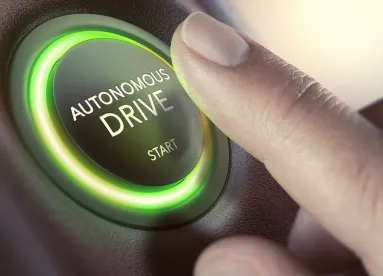On September 6, 2017, the House of Representatives passed the Safely Ensuring Lives Future Deployment and Research In Vehicle Evolution (“SELF DRIVE”) Act, H.R. 3388. All eyes are now on the Senate, which is drafting its own bill.
The House Energy and Commerce Committee touts the SELF DRIVE Act as improving NHTSA’s “ability to adapt federal safety standards to this emerging technology, and clarify[ing] federal and state roles with respect to self-driving cars.” See here. As previously covered here on Dashboard Insights, the bipartisan SELF DRIVE Act proposes to present a clear path for the testing, development, and deployment of highly-automated vehicles by, among other things:
-
Clarifying NHTSA’s role in regulating the design, construction, and performance of highly automated vehicles, automated driving systems, or components of such systems, and expressly preempting differing or conflicting state laws on these matters;
-
Requiring NHTSA to promulgate a rule requiring manufacturers to submit a safety assessment certification for highly automated vehicles and automated driving systems, while requiring manufacturers to submit safety assessment letters described in the Federal Automated Vehicles Policy (or any successor guidance);
-
Requiring manufacturers to develop detailed cybersecurity plans for automated vehicles;
-
Expanding NHTSA’s exemption authority to facilitate development or field evaluation of highly automated vehicles that are demonstrated to be at least as safe as vehicles meeting those standards for which an exemption is sought;
-
Directing NHTSA to establish a Highly Automated Vehicle Advisory Council to help the Agency stay current in this rapidly evolving field; and
-
Requiring manufacturers to develop a written privacy plan specifying how data from automated vehicles will be collected, used, shared and stored, while clarifying that the Federal Trade Commission will continue to enforce violations of these requirements under Section 5 of the Federal Trade Commission Act.
The SELF DRIVE Act also includes what is likely a nod to consumer advocates by mandating that NHTSA promulgate a rule requiring passenger vehicles to be equipped with a system that alerts the operator to check the rear seats after the vehicle is turned off. The Act also would require NHTSA to research the development of updated headlamp standards and to revise those standards based upon the agency’s findings.
Within the Senate, there is bipartisan interest in legislation that addresses issues related to automated vehicles. In June of this year, Senators John Thune (R.-S.D.) (Chairman of the Commerce, Science, & Transportation Committee), Bill Nelson (D-Fla.) (Ranking Member), and Gary Peters (D-Mich.) released their “Principles for Bipartisan Legislation on Self-Driving,” the basic elements of which include:
-
Prioritize safety;
-
Promote continued innovation and reduce existing roadblocks;
-
Remain tech neutral;
-
Reinforce separate Federal and state roles;
-
Strengthen cybersecurity; and
-
Educate the public to encourage responsible adoption of self-driving vehicles.
Most of these principles are addressed by the SELF DRIVE Act.
On September 13, 2017, the Senate Commerce, Science, and Transportation Committee is scheduled to convene a hearing titled “Transportation Innovation: Automated Trucks and Our Nation’s Highways,” during which the Committee will hear testimony from representatives of manufacturers, law enforcement, commercial vehicle operators, public interest groups, and labor unions. The stated focus of the hearing is to “examine the benefits of automated truck safety technology” and to look at the potential impacts this technology could have on jobs and the economy. (The hearing notice is available here.





 />i
/>i
